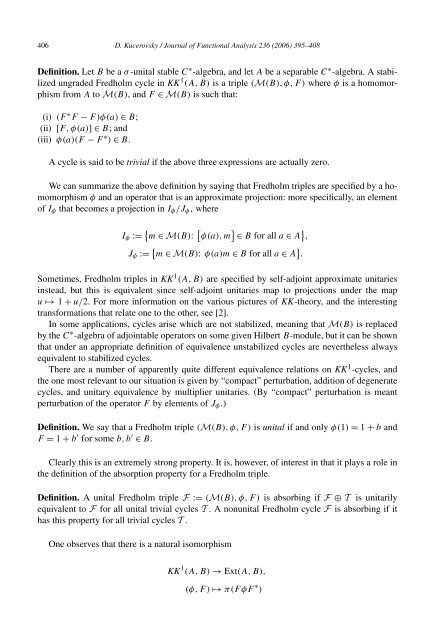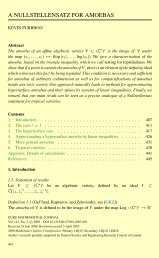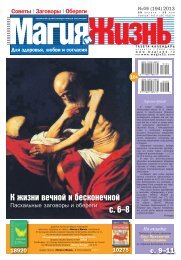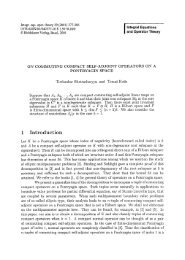- Page 1 and 2: Journal of Functional Analysis 236
- Page 3 and 4: H.-Q. Li / Journal of Functional An
- Page 5 and 6: H.-Q. Li / Journal of Functional An
- Page 7 and 8: x(s) = H.-Q. Li / Journal of Functi
- Page 9 and 10: H.-Q. Li / Journal of Functional An
- Page 11 and 12: H.-Q. Li / Journal of Functional An
- Page 13 and 14: H.-Q. Li / Journal of Functional An
- Page 15 and 16: et et Donc, H.-Q. Li / Journal of F
- Page 17 and 18: H.-Q. Li / Journal of Functional An
- Page 19 and 20: et Posons H.-Q. Li / Journal of Fun
- Page 21 and 22: ⎛ ⎜ ⎝ − H.-Q. Li / Journal
- Page 23 and 24: Donc, H.-Q. Li / Journal of Functio
- Page 25 and 26: 5. Quelques problèmes ouverts H.-Q
- Page 27 and 28: Journal of Functional Analysis 236
- Page 29 and 30: D. Kucerovsky / Journal of Function
- Page 31 and 32: D. Kucerovsky / Journal of Function
- Page 33 and 34: D. Kucerovsky / Journal of Function
- Page 35 and 36: D. Kucerovsky / Journal of Function
- Page 37: D. Kucerovsky / Journal of Function
- Page 41 and 42: Journal of Functional Analysis 236
- Page 43 and 44: D. Serre / Journal of Functional An
- Page 45 and 46: D. Serre / Journal of Functional An
- Page 47 and 48: The assumption tells us that the fo
- Page 49 and 50: D. Serre / Journal of Functional An
- Page 51 and 52: D. Serre / Journal of Functional An
- Page 53 and 54: D. Serre / Journal of Functional An
- Page 55 and 56: D. Serre / Journal of Functional An
- Page 57 and 58: 3.4. The zeroes of ( √ z, η) D.
- Page 59 and 60: D. Serre / Journal of Functional An
- Page 61 and 62: 4.1. Persistence of surface waves D
- Page 63 and 64: D. Serre / Journal of Functional An
- Page 65 and 66: D. Serre / Journal of Functional An
- Page 67 and 68: D. Serre / Journal of Functional An
- Page 69 and 70: When G = η ⊗ r, we obtain Becaus
- Page 71 and 72: This polynomial satisfies D. Serre
- Page 73 and 74: D. Serre / Journal of Functional An
- Page 75 and 76: D. Serre / Journal of Functional An
- Page 77 and 78: D. Serre / Journal of Functional An
- Page 79 and 80: Journal of Functional Analysis 236
- Page 81 and 82: A. Wi´snicki / Journal of Function
- Page 83 and 84: A. Wi´snicki / Journal of Function
- Page 85 and 86: Therefore, A. Wi´snicki / Journal
- Page 87 and 88: A. Wi´snicki / Journal of Function
- Page 89 and 90:
Journal of Functional Analysis 236
- Page 91 and 92:
H. Schultz / Journal of Functional
- Page 93 and 94:
H. Schultz / Journal of Functional
- Page 95 and 96:
H. Schultz / Journal of Functional
- Page 97 and 98:
H. Schultz / Journal of Functional
- Page 99 and 100:
H. Schultz / Journal of Functional
- Page 101 and 102:
H. Schultz / Journal of Functional
- Page 103 and 104:
H. Schultz / Journal of Functional
- Page 105 and 106:
H. Schultz / Journal of Functional
- Page 107 and 108:
H. Schultz / Journal of Functional
- Page 109 and 110:
H. Schultz / Journal of Functional
- Page 111 and 112:
H. Schultz / Journal of Functional
- Page 113 and 114:
H. Schultz / Journal of Functional
- Page 115 and 116:
H. Schultz / Journal of Functional
- Page 117 and 118:
H. Schultz / Journal of Functional
- Page 119 and 120:
H. Schultz / Journal of Functional
- Page 121 and 122:
we now have (cf. (7.8)) that H. Sch
- Page 123 and 124:
J. Van Schaftingen / Journal of Fun
- Page 125 and 126:
J. Van Schaftingen / Journal of Fun
- Page 127 and 128:
2.2. Definition J. Van Schaftingen
- Page 129 and 130:
J. Van Schaftingen / Journal of Fun
- Page 131 and 132:
J. Van Schaftingen / Journal of Fun
- Page 133 and 134:
J. Van Schaftingen / Journal of Fun
- Page 135 and 136:
Since ϕ = ϕ0 + ϕ1 ∧ ωN, one h
- Page 137 and 138:
J. Van Schaftingen / Journal of Fun
- Page 139 and 140:
J. Van Schaftingen / Journal of Fun
- Page 141 and 142:
J. Van Schaftingen / Journal of Fun
- Page 143 and 144:
J. Van Schaftingen / Journal of Fun
- Page 145 and 146:
J. Van Schaftingen / Journal of Fun
- Page 147 and 148:
J. Van Schaftingen / Journal of Fun
- Page 149 and 150:
Journal of Functional Analysis 236
- Page 151 and 152:
A. Olofsson / Journal of Functional
- Page 153 and 154:
A. Olofsson / Journal of Functional
- Page 155 and 156:
A. Olofsson / Journal of Functional
- Page 157 and 158:
A. Olofsson / Journal of Functional
- Page 159 and 160:
A. Olofsson / Journal of Functional
- Page 161 and 162:
A. Olofsson / Journal of Functional
- Page 163 and 164:
A. Olofsson / Journal of Functional
- Page 165 and 166:
A. Olofsson / Journal of Functional
- Page 167 and 168:
A. Olofsson / Journal of Functional
- Page 169 and 170:
A. Olofsson / Journal of Functional
- Page 171 and 172:
A. Olofsson / Journal of Functional
- Page 173 and 174:
A. Olofsson / Journal of Functional
- Page 175 and 176:
A. Olofsson / Journal of Functional
- Page 177 and 178:
A. Olofsson / Journal of Functional
- Page 179 and 180:
K. Koufany, G. Zhang / Journal of F
- Page 181 and 182:
K. Koufany, G. Zhang / Journal of F
- Page 183 and 184:
K. Koufany, G. Zhang / Journal of F
- Page 185 and 186:
K. Koufany, G. Zhang / Journal of F
- Page 187 and 188:
3. The Poisson transform K. Koufany
- Page 189 and 190:
K. Koufany, G. Zhang / Journal of F
- Page 191 and 192:
K. Koufany, G. Zhang / Journal of F
- Page 193 and 194:
K. Koufany, G. Zhang / Journal of F
- Page 195 and 196:
K. Koufany, G. Zhang / Journal of F
- Page 197 and 198:
K. Koufany, G. Zhang / Journal of F
- Page 199 and 200:
K. Koufany, G. Zhang / Journal of F
- Page 201 and 202:
K. Koufany, G. Zhang / Journal of F
- Page 203 and 204:
K. Koufany, G. Zhang / Journal of F
- Page 205 and 206:
Its limit when t → 0is K. Koufany
- Page 207 and 208:
K. Koufany, G. Zhang / Journal of F
- Page 209 and 210:
K. Koufany, G. Zhang / Journal of F
- Page 211 and 212:
and K. Koufany, G. Zhang / Journal
- Page 213 and 214:
Journal of Functional Analysis 236
- Page 215 and 216:
A. Porretta, L. Véron / Journal of
- Page 217 and 218:
A. Porretta, L. Véron / Journal of
- Page 219 and 220:
A. Porretta, L. Véron / Journal of
- Page 221 and 222:
A. Porretta, L. Véron / Journal of
- Page 223 and 224:
A. Porretta, L. Véron / Journal of
- Page 225 and 226:
L. Miller / Journal of Functional A
- Page 227 and 228:
L. Miller / Journal of Functional A
- Page 229 and 230:
1.2. Spectral and growth bounds L.
- Page 231 and 232:
L. Miller / Journal of Functional A
- Page 233 and 234:
L. Miller / Journal of Functional A
- Page 235 and 236:
By duality, Kp,T is also defined by
- Page 237 and 238:
L. Miller / Journal of Functional A
- Page 239 and 240:
L. Miller / Journal of Functional A
- Page 241 and 242:
Journal of Functional Analysis 236
- Page 243 and 244:
E. Kissin / Journal of Functional A
- Page 245 and 246:
E. Kissin / Journal of Functional A
- Page 247 and 248:
Using it, we obtain as in (3.2) tha
- Page 249 and 250:
E. Kissin / Journal of Functional A
- Page 251 and 252:
5. Structure of the group ZS E. Kis
- Page 253 and 254:
E. Kissin / Journal of Functional A
- Page 255 and 256:
E. Kissin / Journal of Functional A
- Page 257 and 258:
E. Kissin / Journal of Functional A
- Page 259 and 260:
E. Kissin / Journal of Functional A
- Page 261 and 262:
E. Kissin / Journal of Functional A
- Page 263 and 264:
M.J. Crabb / Journal of Functional
- Page 265 and 266:
M.J. Crabb / Journal of Functional
- Page 267 and 268:
S. Albeverio, A. Kosyak / Journal o
- Page 269 and 270:
S. Albeverio, A. Kosyak / Journal o
- Page 271 and 272:
S. Albeverio, A. Kosyak / Journal o
- Page 273 and 274:
S. Albeverio, A. Kosyak / Journal o
- Page 275 and 276:
S. Albeverio, A. Kosyak / Journal o
- Page 277 and 278:
The minimum is realized for S. Albe
- Page 279 and 280:
S. Albeverio, A. Kosyak / Journal o
- Page 281 and 282:
S. Albeverio, A. Kosyak / Journal o
- Page 283 and 284:
S. Albeverio, A. Kosyak / Journal o
- Page 285 and 286:
S. Albeverio, A. Kosyak / Journal o
- Page 287 and 288:
S. Albeverio, A. Kosyak / Journal o
- Page 289 and 290:
For m = 3wehave S. Albeverio, A. Ko
- Page 291 and 292:
S. Albeverio, A. Kosyak / Journal o
- Page 293 and 294:
S. Albeverio, A. Kosyak / Journal o
- Page 295 and 296:
hence S. Albeverio, A. Kosyak / Jou
- Page 297 and 298:
φpq(t; tqq) = Since = S. Albeveri
- Page 299 and 300:
S. Albeverio, A. Kosyak / Journal o
- Page 301 and 302:
hence C = C3 = S. Albeverio, A. Kos
- Page 303 and 304:
S. Albeverio, A. Kosyak / Journal o
- Page 305 and 306:
S. Albeverio, A. Kosyak / Journal o
- Page 307 and 308:
S. Albeverio, A. Kosyak / Journal o
- Page 309 and 310:
S. Albeverio, A. Kosyak / Journal o
- Page 311 and 312:
and S. Albeverio, A. Kosyak / Journ
- Page 313 and 314:
S. Albeverio, A. Kosyak / Journal o
- Page 315 and 316:
D. Brydges, A. Talarczyk / Journal
- Page 317 and 318:
D. Brydges, A. Talarczyk / Journal
- Page 319 and 320:
D. Brydges, A. Talarczyk / Journal
- Page 321 and 322:
D. Brydges, A. Talarczyk / Journal
- Page 323 and 324:
D. Brydges, A. Talarczyk / Journal
- Page 325 and 326:
D. Brydges, A. Talarczyk / Journal
- Page 327 and 328:
D. Brydges, A. Talarczyk / Journal
- Page 329 and 330:
Furthermore, D. Brydges, A. Talarcz
- Page 331 and 332:
D. Brydges, A. Talarczyk / Journal
- Page 333 and 334:
D. Brydges, A. Talarczyk / Journal
- Page 335 and 336:
D. Brydges, A. Talarczyk / Journal
- Page 337 and 338:
D. Brydges, A. Talarczyk / Journal
- Page 339 and 340:
D. Brydges, A. Talarczyk / Journal
- Page 341 and 342:
D. Brydges, A. Talarczyk / Journal
- Page 343 and 344:
D. Brydges, A. Talarczyk / Journal
- Page 345 and 346:
D. Bucur / Journal of Functional An
- Page 347 and 348:
D. Bucur / Journal of Functional An
- Page 349 and 350:
D. Bucur / Journal of Functional An
- Page 351 and 352:
D. Bucur / Journal of Functional An
- Page 353 and 354:
lim n→∞ Ω lim sup n→∞
- Page 355 and 356:
D. Bucur / Journal of Functional An
- Page 357 and 358:
D. Bucur / Journal of Functional An

















